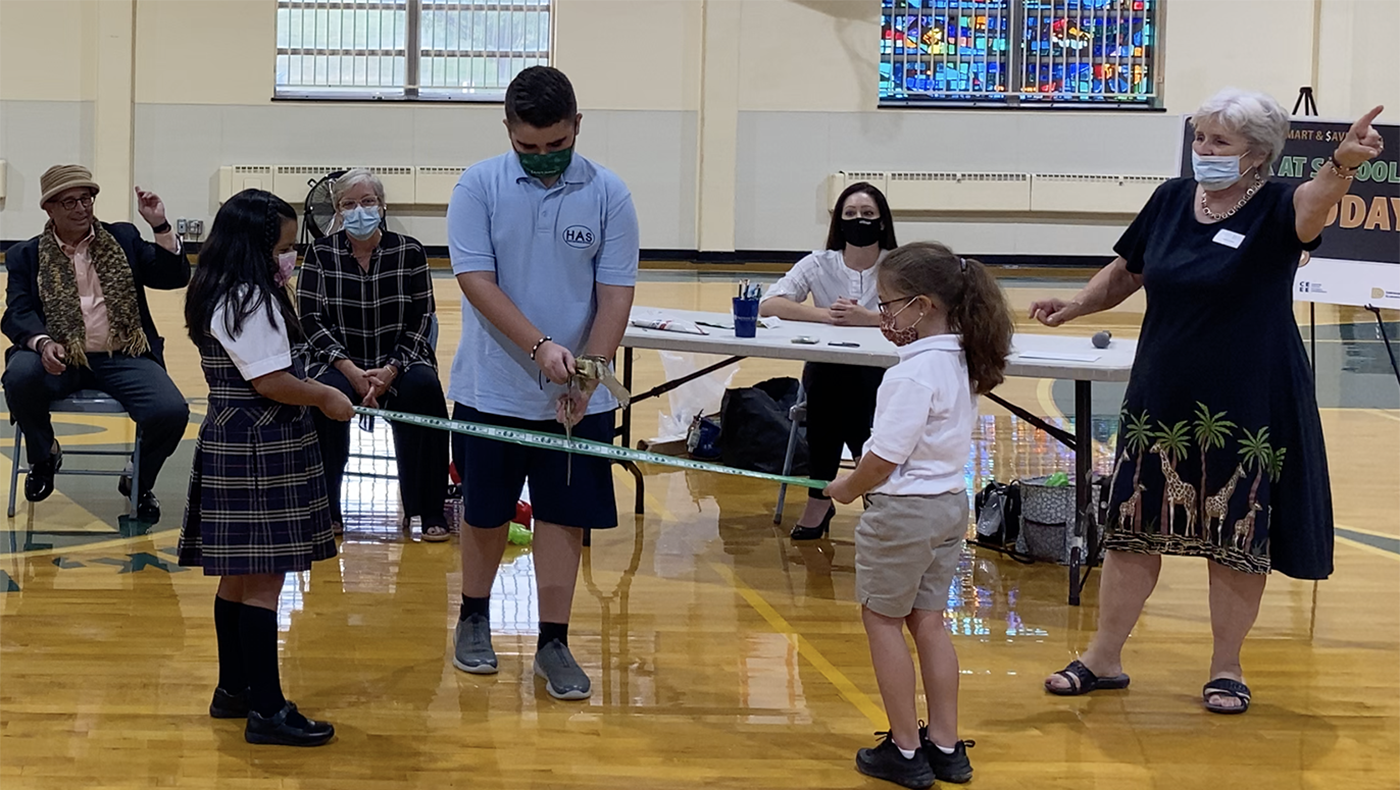On October 12, students at the Holy Angels Elementary School in Newark, Delaware joined representatives from Artisans’ Bank, and Delaware State Bank Commissioner Robert A. Glen to cut the ribbon on the reopening of their Bank at School (BAS) program.
Holy Angels is one of 25 Delaware elementary schools participating in BAS this year. The year-long program, sponsored by the University of Delaware’s Center for Economic Education and Entrepreneurship (CEEE), connects schools across the State of Delaware with local banks and credit unions to teach the students the early ethic and habit of regular saving and financial management. It was postponed last year due to the Covid-19 pandemic.
Offered since 1992, BAS was designed by Bonnie Meszaros, associate director of the CEEE, and Ronni Cohen, retired executive director of the Delaware Financial Literacy Institute.
“Studies show that students nationwide lack basic financial knowledge,” CEEE Bank at School Coordinator Judy Austin said. “These students are more likely to grow up ‘unbanked’ or ‘underbanked,’ not saving money for the long-term and using predatory lending services, such as check cashing, to meet cash flow needs.
“The BAS program provides real banking experiences to students and financial literacy lesson plans to teachers,” Austin continued. “Children begin to develop the life-long ethic of saving by opening and managing savings accounts and learning financial concepts.”
The BAS program provides additional benefits to the students and the bankers. Students also learn long-term planning and potentially establish lifetime accounts since accounts can continue long after students have left a school. Banks and credit unions benefit from the establishment of new accounts, interactions with young people and involvement in community outreach and education.
For Holy Angels Principal Mary Elizabeth Muir, BAS helps children learn “a life skill that will serve them well not just financially, but in all aspects of their lives.”
“It is important for children to learn delayed gratification, goal setting and saving from this program,” Muir said. “Students are learning responsibility in remembering to bring their money to school, some initial financial literacy skills and planning skills.
“It is also great to collaborate with other organizations in the community to provide our children such important life skills.”
In 2018, the Delaware State Board of Education passed K-12 financial literacy standards. Participation in BAS helps teachers address these standards.
This year, approximately 50 representatives from five different Delaware banks and credit unions, such as Artisans’ Bank, set up shop with area elementary schools throughout the state in late September, early October and began regularly accepting deposits shortly after. The program continues through May. Students have the opportunity to open free savings accounts, make weekly deposits and serve as junior tellers.
“Artisans’ Bank strongly believes the BAS program helps children develop a strong foundation in financial matters and brings customer loyalty to the bank,” Artisans’ Senior Vice President and Chief Risk Officer Joel Schiller said.
“Artisans’ Bank is pleased to support Bank at School by actively running programs in multiple schools and by providing cost free savings accounts that pay a premium interest rate,” Schiller continued. “We especially enjoy the weekly one-on-one interactions with the students, explaining to them how to make a deposit, check their account balance and save for important purchases.”
The Office of the State Bank Commissioner has supported the BAS program through grants from the Financial Literacy Education Fund, which was established in 2009 in a law enacted by the General Assembly to support schools and other non-profit organizations that provide financial and economic literacy skills to adults and youth in the State of Delaware. The Financial Literacy Education Fund is administered by the Office of the State Bank Commissioner.
“The Bank at School partnership with the University of Delaware and the elementary schools enables Delaware banks to participate in financial education and encourage prudent financial management skills that are so important for students to learn when they are young,” Glen said.
“A bank is a very safe place for students to keep their money,” Glen continued. “Banks are insured by the federal government, through the Federal Deposit Insurance Corporation, the FDIC, for up to $250,000 for each depositor’s account. When students deposit their money in savings accounts, they won’t be so tempted to spend their money. They can be sure that, whenever they want to get their money back from the bank, whether it’s next week, next month or next year, their money will be safe and will be available for them.”
What are the children saving for? A student at Holy Angels is looking to save for retirement in the long-term, but in the short-term he’s thinking of others and “saves throughout the year to be able to buy gifts for others at Christmas.”
To date, the BAS program is active in all three Delaware counties and five Delaware public school districts: Appoquinimink, Caesar Rodney, Christina, Milford, and Red Clay. Prior to the pandemic, more than 80 schools throughout 13 of Delaware’s 19 school districts participated annually in this program. In addition to Delaware public schools, BAS runs in many City of Wilmington private and Christian schools (Academia Antonia Alonso, First State Montessori, Kuumba Academy, Odyssey Intermediate, Sharon Temple Adventist, Serviam Academy and Urban Promise).




